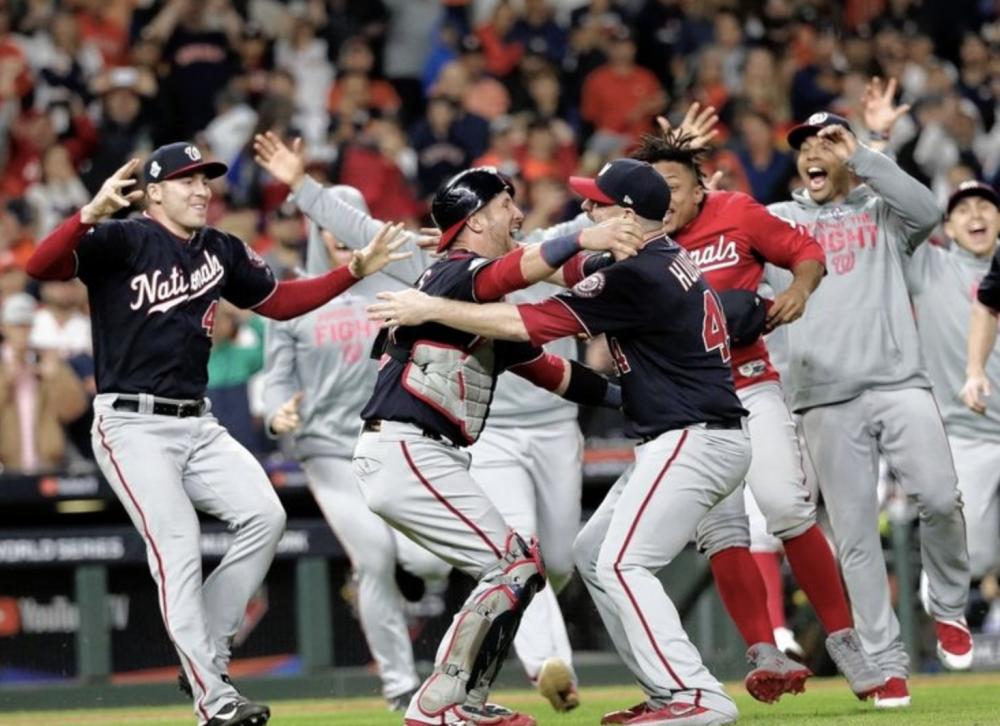(I wrote this column nearly three weeks ago. More urgent columns interfered, delaying publication of this essay, which I trust is still relevant.)
Escapism, that wonderful world where we can briefly block out dread and misery, came alive in full bloom nearly two weeks ago when the Washington Nationals defeated the Houston Astros in the seventh game of the 2019 World Series.
Washington, DC, the source of scarce good news, would claim its first World Series championship since 1924.
The underdog had won.
An older pitcher recovering from muscle spasms that ruled him out of hurling in the fifth game struggled through five innings, giving up two runs, in the seventh and deciding game.
A 94-year-old owner who brought the Washington Nationals to the nation’s capital in 2006 and watched his team stumble sadly in playoffs in recent years could celebrate a monumental sports achievement in the city in which he was raised.
A team that had a dismal record of 19 and 31 in May climbed the highest mountain in Major League Baseball and claimed the pinnacle.
A manager who underwent a heart procedure during the season, a mere blip as ii turned out, guided his team to an October high.
Baseball, our national pastime often surpassed in the public psyche by the more exciting and jarring sport of pro football, grabbed attention and headlines. Deservedly so.
Comebacks are to be cherished. Storybook endings can happen in real life. Rarely, but poignantly.
Through seven games, all that mattered were balls and strikes, superb pitching and timely hitting at times, periodic heroics, hard-fought victories—and just plain, nerve-racking fun. As it’s supposed to be.
I was rooting for the Lerner Family as much as I was the Nats. A college friend is part of the family and actively involved with the team. Since 2012, he has kindly invited me and friends to the owner’s suite at Nationals Park. I’ve often brought bad karma, mostly watching losses and feeling apologetic to my gracious host.
I’ve watched Mr. Lerner watch games. He is typically stoic. Sometimes painfully so. Young players making gobs of money would perform poorly. It’s baseball, after all. Expectations are high.
Enjoying the lush circumstances of the owner’s suite, I often wondered how Mr. Lerner and family members could calmly accept a strikeout by a highly paid star player with the bases loaded, and the game on the line. Or an error made from lack of concentration. Troubling but always characteristic of a game where mistakes are so visible.
If a spectator who paid ample money for a ticket and expensive food and drink felt perturbed at plays not made in the field or at bat, how must an owner who has invested millions in player salaries, scouting and facilities feel in similar situations?
Philosophical, I guess. What’s great about baseball—and indeed life—is that an athlete always has another time at bat, another chance to strike a ball, not just air, or to field a ball flawlessly and execute a double play.
Maybe there’s a reason that baseball is the national pastime. It requires skill. It requires hard work. It requires patience. And it requires mental discipline to forget your past strikeout or poorly located pitched ball that becomes a home run.
Redemption is just around the corner. The taste of success is quickly achievable—and momentary. On to the next stumble, next error of judgment. Next game-changing hit or fielding gem.
The Nationals are now world champions. The euphoria still pervades the team and city. The fan adulation is intoxicating.
The Lerner Family persevered. It continued to invest in high-priced athletes. It kept its eye on the often-disappointed fan base.
Victory on the world stage overshadows the difficult, tortuous journey. Anything is possible. The past is just that. The future offers hope and promise.
Bring on 2020 and no assurance of similar success. Star players will leave for mind-blogging riches. Loyalty is illusory. Money matters.
My guess is that the Washington Nationals will always embody grit and determination. And the hot dogs, though over-priced, taste so much better at a ballpark.
No give-up is a guiding principle. A universal concept, right?
Columnist Howard Freedlander retired in 2011 as Deputy State Treasurer of the State of Maryland. Previously, he was the executive officer of the Maryland National Guard. He also served as community editor for Chesapeake Publishing, lastly at the Queen Anne’s Record-Observer. In retirement, Howard serves on the boards of several non-profits on the Eastern Shore, Annapolis and Philadelphia.



Write a Letter to the Editor on this Article
We encourage readers to offer their point of view on this article by submitting the following form. Editing is sometimes necessary and is done at the discretion of the editorial staff.